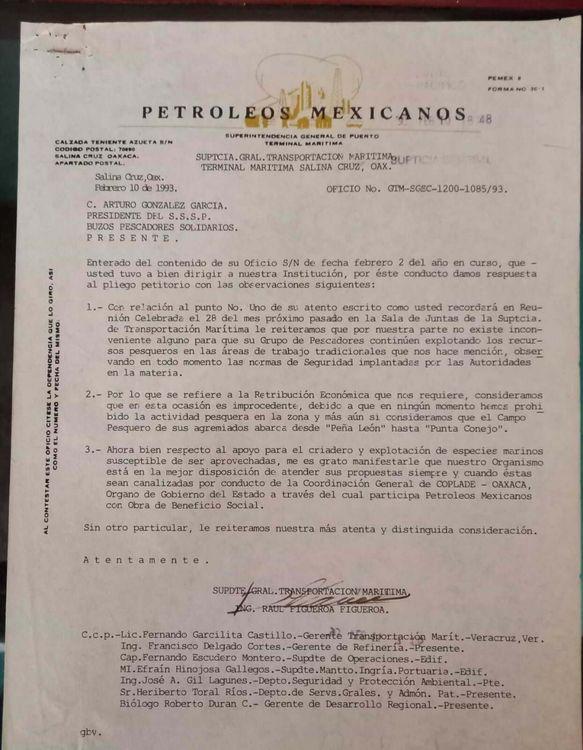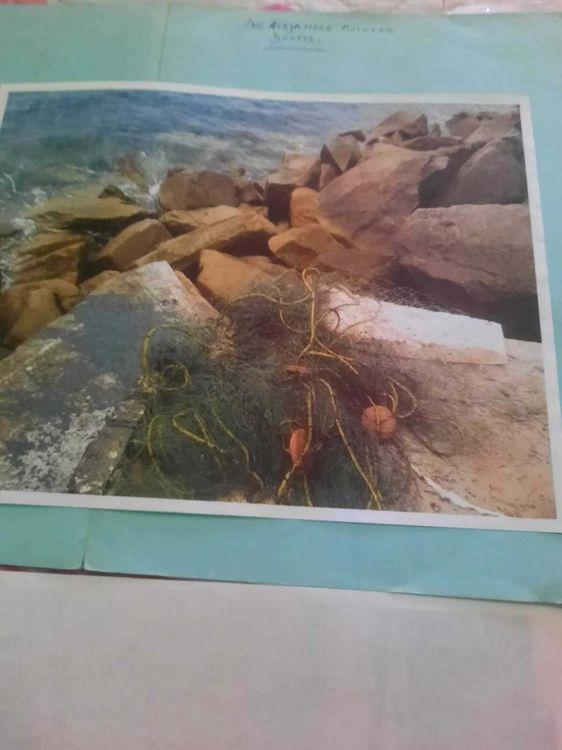The waves of the sea that break at the maritime terminal of Salina Cruz, Oaxaca, paint what they touch black: the giant stones, the fishermen's nets and the diving suits.
The cause documented by the inhabitants is the spill of hydrocarbons in the waters of the port due to the activity of the “Antonio Dovalí Jaime” refinery of Petrleos Mexicanos (Pemex), in operation since 1979.
“The spills are constant. In addition to the large ones that have existed in the monobuoys that pollute the beaches, there are other frequent escapes,” said Eleazar Flores Pérez, who has been a diver and fisherman in the area for 40 years. “Even when oil tankers wash their tanks, all that water is thrown into the sea,” he added.
Eleazar heads the Roca Mar Fishermen's Diver Cooperative, which has a permit granted by Pemex to enter the waters of the maritime terminal. Every day, more than 35 fishing divers work in the breakwaters in front of a pipe that flows into the sea. There, near Pier number 9 where ships arrive and Pier number 7 where boats load fuel.
Just last June, local media reported a spill in La Ventosa Bay, in the port of Salina Cruz. Last year, the communities of Salinas del Marqués and Playa Azul were also affected by the escape of a monobuoy driven by Pemex.
“I have been legal representative of the Roca Mar Cooperative for 12 years and during these years I have been to Pemex countless times, even with officials who have already retired. We have been there constantly. Every spill we throw in jobs but there is no support,” added Eleazar Flores.

Agreement between Pemex and the Roca Mar Fishermen's Divers Cooperative signed in 1993 to work on the maritime terminal. Photo: Roca Mar Fishermen's Diver Cooperative
The dangers of swimming in gasoline
Roca Mar's scuba divers aren't the only ones organized. Since 2017, there have been demonstrations by residents calling for the intervention of the Federal Attorney for Environmental Protection (Profepa) to make Pemex take responsibility for the issue of pollution.
“Petroleum or any type of hydrocarbon, crude or refined, damages marine ecosystems, producing one or more of the following effects: death of organisms due to suffocation, decreased resistance or increased infections in species, negative effects on marine fauna and flora,” the organization explained.
In addition, Pemex is evaluated as the third oil company in the world with the highest environmental and social impacts. According to Sustainalytics' ESG sustainability indicators, the Mexican company exceeds the allowed 50 points with 56.7.
The information was published last May in the study “Pemex's Corporate Responsibility on Test” in Mexico Evalua focused on the Tula Thermoelectric Power Plant. The first place is occupied by China's Guaunhui Energy with 59.7 and the second place is held by the American Parsley Energy with 57.3.
What happens when they dump the fuel into the sea? “The lion's claw, the daisy's rooster, the queen clam, they all died... All that seafood died. It has decreased a lot and it has affected us,” Eleazar Flores replied.
Species have been dying for decades. For example, in 2010, Profepa filed a criminal complaint against Pemex for the death of sea turtles and damage to beaches and mangroves due to “alleged hydrocarbon spill” recorded that year in monobuoy three.
According to opinions issued by specialists from the National Polytechnic Institute (IPN) and the Federal Police laboratory, the turtles showed “systemic involvement and damage and poisoning by hydrocarbons”.
In addition, the consequences of almost 30 years of work at the maritime terminal are also everyday. Eleazar, like his colleagues, experiences hair loss and skin rashes. When this happens, use different types of creams and ointments to soothe itching and pimples that appear on your body.
“We (the fishermen) are also divers. We are in the water, completely in the water. Discharges affect our health, kill species and pollute the sea,” he summarized.
According to Greenpeace, petroleum or its components can come into contact with the human body through three routes: absorption through the skin, ingestion of food and drink, and inhalation through breathing. Such exposures may irritate the skin, cause itchy or irritated eyes, nausea, dizziness, vertigo, or headaches. In more severe cases, pneumonia or chronic diseases.

Photographs of fishing gear stained by the sea, documented by divers from Salina Cruz. Photo: Roca Mar Fishermen's Diver Cooperative
Sustainability at low prices
The latest Pemex Sustainability Report mentions the incorporation of the oil company in the 2019-2023 Business Plan to reduce the company's environmental impact.
Some of the actions it is committed to are reducing the rate of water use and increasing reuse in refineries, contributing to the mitigation of the effects of climate change, reducing sulfur dioxide emissions and conserving its environmental services.
However, from 2016 to 2017, there was a 48% cut in the budget allocated for the ecological environment, that is, actions to reduce environmental impact. The cuts continued: from 2017 to 2018 it was 43%, while the fall from 2018 to 2019 was 72%, according to data from the Federal Supreme Audit Office.
“It is urgent for Pemex to measure and evaluate its ESG risks, both to address damage to communities, and to gain investment relevance and access better financing conditions. The oil company must also consider issues such as local communities' access to land, their right to health and an adequate standard of living,” Mexico Evalúa shared in a statement after the publication of its study in Tula, Hidalgo.
For the divers of Salina Cruz, the first step that should be taken is the proper maintenance of Pemex equipment. In more extreme cases, their adaptation to an uncontaminated area of the sea.
“Just have them talk to us (the fishermen) or reinstall us somewhere less affected. We want to look for another alternative because contamination from spills is constant. They are here, these constant escapes that don't always reach the beaches but are happening in this area, where they load their ships,” concluded Eleazar Flores.



Comentarios (0)